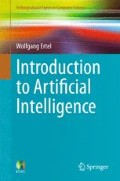Abstract
In propositional logic, as the name suggests, propositions are connected by logical operators. The statement “the street is wet” is a proposition, as is “it is raining”. These two propositions can be connected to form the new proposition “if it is raining the street is wet”. Written more formally: “it is raining ⇒ the street is wet”. Introducing important concepts such as syntax, semantics, interpretation, model, correctness, completeness, calculus, etc., this chapter serves as a “warm up” for first order predicate logic in Chap. 3. The language of propositional logic will also be used in Chap. 7 as a basis for probabilistic logic.
Notes
- 1.
Here Q stands for query.
References
M. Berrondo. Fallgruben für Kopffüssler. Fischer Taschenbuch, Nr. 8703, 1989.
Author information
Authors and Affiliations
Corresponding author
Rights and permissions
Copyright information
© 2011 Springer-Verlag London Limited
About this chapter
Cite this chapter
Ertel, W. (2011). Propositional Logic. In: Introduction to Artificial Intelligence. Undergraduate Topics in Computer Science. Springer, London. https://doi.org/10.1007/978-0-85729-299-5_2
Download citation
DOI: https://doi.org/10.1007/978-0-85729-299-5_2
Publisher Name: Springer, London
Print ISBN: 978-0-85729-298-8
Online ISBN: 978-0-85729-299-5
eBook Packages: Computer ScienceComputer Science (R0)

